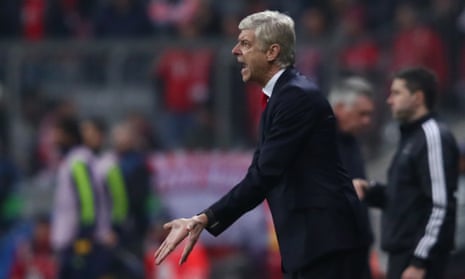The words that clanged in the immediate aftermath were “mentally very jaded” and, if Arsène Wenger chose them with reference to his players and the specifics of a dismal second-half breakdown, the truth is that phrase is applicable at Arsenal Football Club with a significantly broader brush. The dictionary definition of jaded feels piercingly critical: dulled or satiated by overindulgence; worn out or wearied; dissipated.
Jaded seemed to be everywhere for the beleaguered visitors in Munich – in the all too familiar image of Alexis Sánchez down on his haunches staring into space; in Mesut Özil, promised enormous financial rewards to sign a contract extension that he is yet to autograph but failing to influence another big away game; in Alex Oxlade-Chamberlain actually jumping up and down with frustration that Bayern were able to so easily toy with predictably fragile, dazed, sorry opponents; in the disillusioned outpourings of fans who travel to the toughest assignments without much expectation; in the board sitting quietly powerless as they watch; in Wenger himself, looking hollowed out at the end of it all.
The thing is, Arsenal have been jaded before. It has felt like Wenger’s endgame before. Is this 5-1 humiliation in Munich notably worse, or more damning, than the last one? Or the 8-2 at Manchester United? The 6-0 at Chelsea? The 4-0 in Milan …? Will Wenger and his players regroup for the season to recover to a point of respectability (as they usually do) and will that be enough? Or are these things cumulative? Is there a scenario where Arsenal reach one whopping loss too many? Where is the tipping point and are they there yet?
These are the questions that must be answered in the coming weeks. What a bizarre scenario – both Wenger personally and Arsenal as a club must ponder a possible break-up 21 years into a relationship that has defined both of them, and while they do so the contract to carry on remains on the table. Wenger has said he will make a decision in March or April “probably” but trying to face the music while simultaneously wondering if they should have one last dance is a strange position indeed.
There is a paralysis at Arsenal that makes this situation so difficult to resolve. Any discussion about the club’s management boils down to the relationship between Wenger and Stan Kroenke, the majority shareholder who regards his asset from a distance. No matter how turbulent the hullaballoo around Wenger on the subject of his future, the only two people who have any kind of significant say are Kroenke and the man in the mirror. The rest is just white noise.
The personal relationship between the two men is strong and respectful. There is no evidence of Kroenke showing anything other than an unquestioning admiration for Wenger and his ideas, and the kind of nightmare defeat endured at Bayern Munich is not about to change any of that.
It leaves Arsenal in the unusual position where the manager is held in such esteem he dictates his own future. There is no great appetite for change from Kroenke, who seems satisfied with the club’s business model. As for Wenger’s appetite for change, do not underestimate how scary a proposition it is for him to wake up in the morning and not be a football manager. The game, in particular Arsenal, has been his obsession for so long and he is not a man who welcomes relaxing or has other hobbies to enjoy.
It is hard to imagine Wenger and Kroenke having a heart to heart, or a hard conversation, about what happens now. Wenger knows he can carry on if he wishes and, because of the board’s regard for his work over two decades, he gets to make that decision in his own time. It leaves Arsenal in limbo and in a sticky situation in terms of summer planning. Of course it has an impact on the contract negotiations with players such as Sánchez and Özil.
So Arsenal’s future hinges on Kroenke’s stand-back-and-wait position and Wenger’s self-analysis come the season’s end. Meanwhile the other senior executives and members of the board sit on their hands. But perhaps they shouldn’t. Might somebody find the courage to put their head above the parapet and crash through this inertia? Could the chief executive, Ivan Gazidis, or the chairman, Sir Chips Keswick, put a call through to Kroenke and tell him a few home truths, or pull Wenger to one side and gently try to take the big decision away from him?
Essentially, this is an awful choice for Wenger to make and it might actually be easier if it wasn’t his to call. He betrays no sign of wanting to stop and it is bound to feel immensely painful when he does. He is not like Sir Alex Ferguson in reaching a point where it feels natural to change his lifestyle. But the club have to look beyond what feels right for Arsène Wenger, even if that takes them out of their comfort zone and into a more ruthless place.
It is understandable that Arsenal are wary of the radical change that will come whenever the day finally arrives that they have a different face in the dugout. Whoever follows has serious shoes to fill. After all, even at this crisis point, taking a step back from the emotional reaction to the brutal lesson in Munich, Wenger is not in a catastrophic position compared with most of his contemporaries at the top of English football. Antonio Conte is obviously leading the way but Wenger’s Arsenal are bang in the middle of the cluster of Premier League chasers, with Pep Guardiola’s Manchester City, Mauricio Pochettino’s Tottenham, Jürgen Klopp’s Liverpool and José Mourinho’s Manchester United (and four out of the top six were not even in the position to get thrashed in the Champions League knockout stages).
That said, Arsenal’s board have to brace themselves for the reaction to a price hike in season tickets – already announced at the so-calledclub level. More of the same at a more expensive price is going to be a tough sell.
The biggest problem when things get jaded is it takes something dramatic to snap out of it. Arsenal, however, are not a club designed to do dramatic things. It may not suit them to shake everything up but they have to face it and the sooner the better.

